Looking for an e-commerce solution that won’t break the bank? Look no further!
We’ve compiled a list of the 10 most affordable e-commerce platforms to help you launch and grow your business. But before jumping in, let’s review the criteria we used to evaluate these platforms.
Criteria for Selecting the Best Cheap E-commerce Platforms
Finding the right e-commerce platform for your small business can feel like locating a needle in a haystack. There are just too many features to consider. Too many pricing models to wrap your head around.
But having plenty of options isn’t necessarily a negative, especially when you know the criteria to consider while choosing an e-commerce platform to build your e-commerce website.
A. Cost-Effectiveness
Affordable e-commerce solutions positively impact your budgeting, profitability, and overall cost-effectiveness. Additionally, they ensure you spend less time worrying about operational costs, including transaction and subscription fees, and more time scaling your small business.
B. User-Friendly Interface
Usability should be high on your priority list when prospecting for e-commerce solutions. After all, you wouldn’t want to waste time understanding a complex interface, even if it sits atop a state-of-the-art platform.
As Paul Haywood, owner of ecommerce-gold, puts it:

C. Scalability
Scalability should serve as a benchmark to measure the performance of any potential e-commerce hosting solutions. Only through scalability can you decide whether a platform would accommodate a higher volume of users as your business grows; whether it would support load balancing (efficient use of servers) and lazy loading (delayed image loading) to deliver peak performance during high demand; or whether it would allow you to create multiple stores under the same hood.
D. Integration With Third-Party Tools
Seamless integration with third-party apps is crucial to running a virtual storefront, After all, as you grow and diversify your business, you need customized solutions such as support for multiple payment gateways, monthly subscriptions, and social media selling to boost your conversions. But it’s not just that. Third-party tools also allow you to capture new customers via advanced targeting and analytics and create a following that raves about your services.
E. Customer Support
Starting an online business can be challenging, and without proper guidance, it can be nearly impossible. That’s why reliable access to customer support is indispensable to choosing an e-commerce platform.
As a small business owner who’s probably going at it solo or with a small team, you must look for solutions that offer 24/7 support. And then refine your choices based on the range of channels (live chat, social media, email, phone) provided for support.
The top most affordable (cheap) e-commerce platforms we’ve chosen are the following:
- Shopify
- BigCommerce
- WooCommerce
- Wix
- Zen Cart
- Weebly
- Squarespace
- Volusion
- GoDaddy Online Store
- Shift4Shop
Top 10 Best Cheap E-commerce Platforms for Small Businesses
1.Shopify

As far as affordable e-commerce solutions go, Shopify is as affordable as it gets. But the e-commerce giant has a lot more to offer beyond an attractive price tag.
Take, for instance, third-party integrations. Shopify is known for its ease of customization and seamless integration with various payment gateways and marketing tools.
It also offers robust customer support via 24/7 live chat, email, and an active community of users.
For first-time business owners, Shopify’s courses are a treasure trove – brimming with expert insights and strategies to drive real growth. And if that doesn’t get you on board, check out its POS (point of sale) system that allows small businesses to scale their operations to brick-and-mortar stores.
Other Benefits Include:
- Ease of use: It doesn’t take a tech aficionado to configure a Shopify store. With an array of third-party tools, anyone can customize an online marketplace to match their vision.
- Inventory Management: Shopify’s integrated inventory management feature allows you to track payments and returns and gather real-time insights, all in one place.
- Multi-Channel Marketing: With Shopify as your e-commerce solution, you can target multiple channels (including brick-and-mortar stores) to reach customers.
- SEO Optimization: Shopify stores come with a set of in-built SEO features like sitemap.xml, robots.txt, and auto-generated canonical tags that prevent duplicate content from appearing in search engines. However, to gain valuable insights into customer behavior, you have to integrate third-party tools into your store.
Some Disadvantages:
- Limited customization options: Beyond a certain point, Shopify’s in-built options may prove to be inadequate for delivering unique customer experiences. Of course, third-party tools can ease these restrictions, but not before they burn a hole in your pocket.
- Learning Curve: While it’s hailed for its ease of use, Shopify can be a bit overwhelming for new e-commerce users to navigate.
- Transaction Costs: Shopify imposes a transaction fee on users (ranging from 2% for basic to 0.5% for advanced users) unless they opt for Shopify Payments. For businesses seeking flexible payment solutions, this could be a huge drawback.
What Are Users Saying About Shopify?
At the time of writing, Shopify had 4,288 reviews on G2 with an average rating of 4.4 out of 5. Here’s a glimpse of what its users have to say:
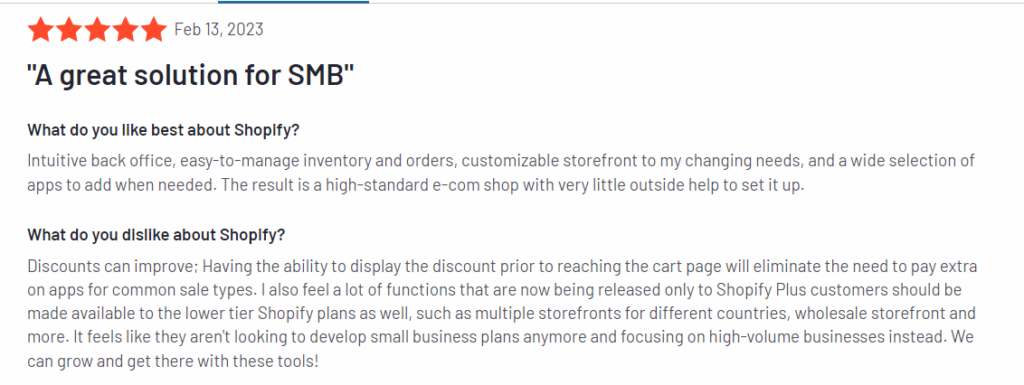

Shopify Pricing
Shopify has a three-tier pricing model: Basic, Shopify, and Advanced
| Feature | Basic | Shopify | Advanced |
| 24/7 Support | Yes | Yes | Yes |
| Staff Accounts | 2 | 5 | 15 |
| Inventory Locations | Up to 4 | Up to 5 | Up to 8 |
| Shipping Discounts | 77% | 88% | 88% |
| Price | $29/mo | $79/mo | $299/mo |
Learn more at Shopify.com
2. BigCommerce
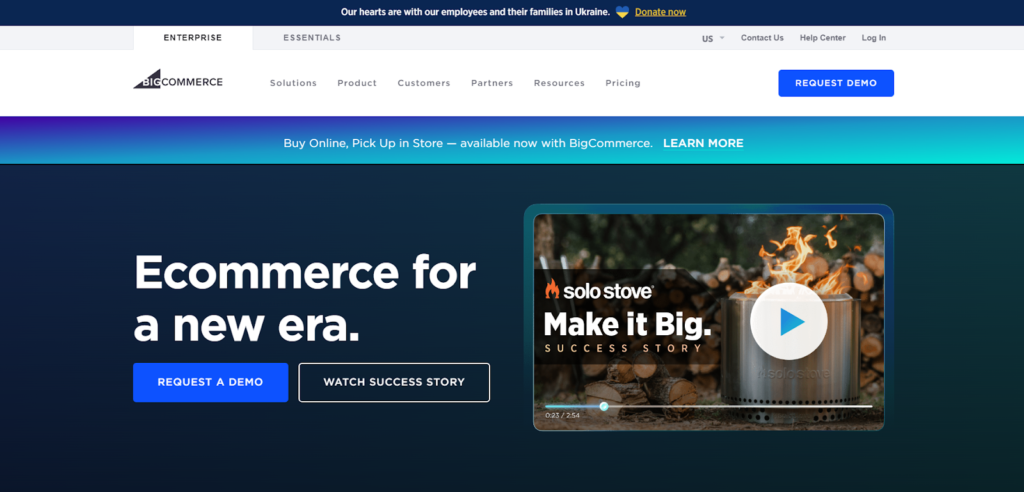
Unlike Shopify, which relies on third-party apps for customization, BigCommerce has in-built capabilities that provide out-of-the-box solutions.
But that’s not the only reason why it’s great eCommerce software for small businesses.
BigCommerce has plenty of incentives such as no transaction fees, an array of APIs and SDKs, and native marketing tools that make it a viable choice for small businesses.
It also excels at scalability due to omnichannel features like multi-storefront, social media selling, and native POS systems.
For customer support, BigCommerce offers 24/7 live chat, email, and phone support (both international and location-specific). It also has a help center that provides some basic assistance through in-depth articles.
Other Benefits Include:
- Unlimited Storage: With BigCommerce’s unlimited storage, users don’t have to limit their catalogs or forgo much-needed optimizations – even at the entry level.
- One-Page Checkout: BigCommerce supports an optimized one-page checkout, which ensures seamless transactions and higher conversions.
- Almost Zero Downtime: As per its claims, BigCommerce has an impressive uptime rate of 99%, making it an exceptional e-commerce solution.
- Tax Display and Processing: BigCommerce takes your user experience a step further with tax display and processing features that show appropriate taxes based on location.
Some Disadvantages:
- Automatic Plan Upgrades: BigCommerce plans entail an annual sales limit. When you hit that limit, you’re automatically upgraded to a higher plan, which raises your costs.
- Limited Sales Acquisition Support: Although entry-level BigCommerce accounts have access to myriad features, they’re offered limited support in terms of sales acquisition. For instance, both persistent and abandoned carts are available to BigCommerce Plus and more advanced users. Similarly, stored credit card support – which makes payments much easier – is only available to advanced users.
What Are Users Saying About BigCommerce?
At the time of writing, BigCommerce had 453 reviews on G2 with an average rating of 4.2 out of 5. Here’s a glimpse of what its users have to say:
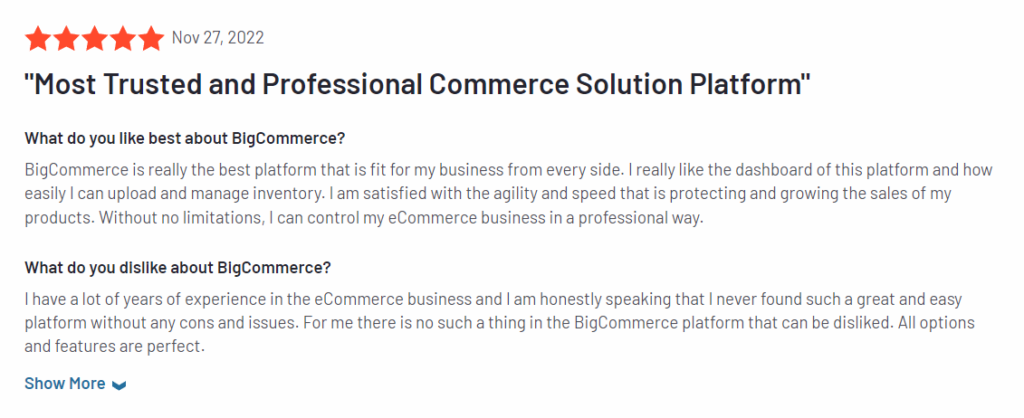

BigCommerce Pricing
BigCommerce has a four-tier pricing model:
| Feature | Standard | Plus | Pro | Enterprise |
| Storage | Unlimited | Unlimited | Unlimited | Unlimited |
| Multi-Storefront | Up to 3 | Up to 5 | Up to 8 | Contact |
| Inventory Locations | Up to 4 | Up to 5 | Up to 8 | Custom |
| Pricing | $29/mo | $79/mo | $299/mo | Contact sales |
Learn more at BigCommerce.com
3. WooCommerce

WooCommerce is one of the most popular SaaS eCommerce platforms for WordPress. It caters to businesses of all sizes and has built-in features that support extensive customization.
For small businesses, WooCommerce offers baked-in capabilities like actionable analytics and secure payments that help them streamline their operations. And since it’s open-source, it gives them total control over their order and customer information.
When it comes to scalability, WooCommerce offers users a rich range of integrations. This includes marketing channels like Google Ads, TikTok, and Facebook and sales channels like Amazon, Etsy, and eBay.
Other Benefits Include:
- SEO Optimization: Since it’s built on top of WordPress, WooCommerce is very SEO-compliant and comes with built-in support for Google Analytics.
- Mobile Responsiveness: With WooCommerce themes and plugins, you can design unique user experiences that render seamlessly on phones.
- Robust Security Features: By default, WooCommerce only retains data that complies with GDPR and PCI-DSS (Payment Card Industry Data Security Standard) requirements. However, for sensitive information, like credit card details, the platform relies on secure tokenization.
Some Disadvantages:
- Lack of Centralised Support: Unlike Shopify or BigCommerce, WooCommerce doesn’t have centralized customer support. Of course, it offers technical support across different timezones, but it doesn’t cover integrations outside its ecosystem.
- Suboptimal User Experience: Deploying a WooCommerce store can be challenging for new users. Although a pre-installed version can mitigate this issue, the setup would still require expert assistance or some degree of experience.
What Are Users Saying About WooCommerce?
At the time of writing, WooCommerce had 1,057 reviews on G2 with an average rating of 4.4 out of 5. Here’s a glimpse of what its users have to say:
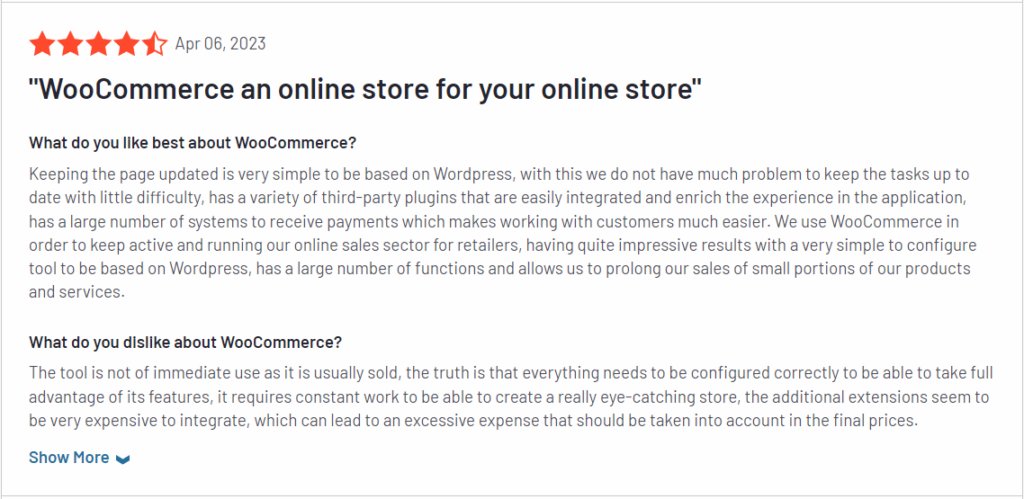
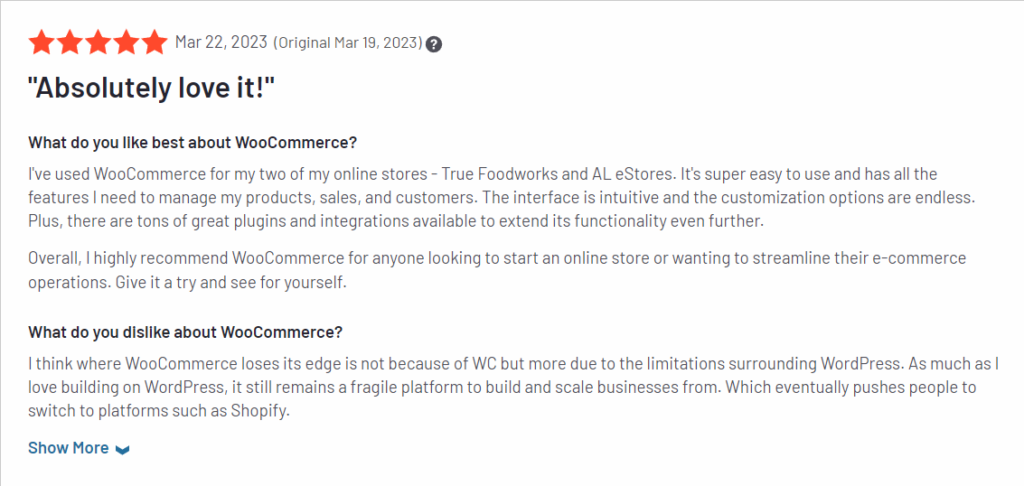
WooCommerce Pricing
Both WooCommerce and WordPress are open-source tools available free of charge. However, a domain name, hosting plan, and any plugins you choose to integrate with them will incur variable costs.
4.Wix

Wix is a low-cost business website builder with enterprise-grade security and a robust infrastructure. The all-in-one platform supports multiple sales channels, including a POS system, and offers a unified dashboard to streamline your operations.
Regarding scalability, Wix claims it can handle 750 simultaneous transactions. Couple this with its support for 80+ payment gateways, and you have one of the best budget-friendly e-commerce solutions.
For customization, Wix provides over 500 designer-made templates and the flexibility to choose your tech stack. And like Shopify, it gives you multiple resources to learn the ins and outs of building an e-commerce website.
For customer support, Wix has dedicated agents and a help center that offers relevant tutorials and articles.
Other Benefits Include:
- Unified Dashboard: To ensure a cohesive user experience, Wix provides a unified dashboard, which allows you to manage payments, shipping, and analytics – all in one place.
- Zero Sales Fee: Barring a monthly subscription fee and any transaction costs that may apply, Wix doesn’t charge you anything for selling your offerings online.
- Real-time Shipping Calculator: Wix allows merchants from the US (and Brazil) to provide real-time shipping to customers via USPS
Some Disadvantages:
- Loading Speeds: Customer reviews on Capterra suggest that Wix customers face frequent delays, which hampers the overall user experience.
- No Stock Management Emails: Wix doesn’t send you an email if your inventory’s running low on a product. This can certainly become a scalability issue for users expanding their operations.
What Are Users Saying About Wix?
At the time of writing, Wix had 1,581 reviews on G2 with an average rating of 4.2 out of 5. Here’s a glimpse of what its users have to say:
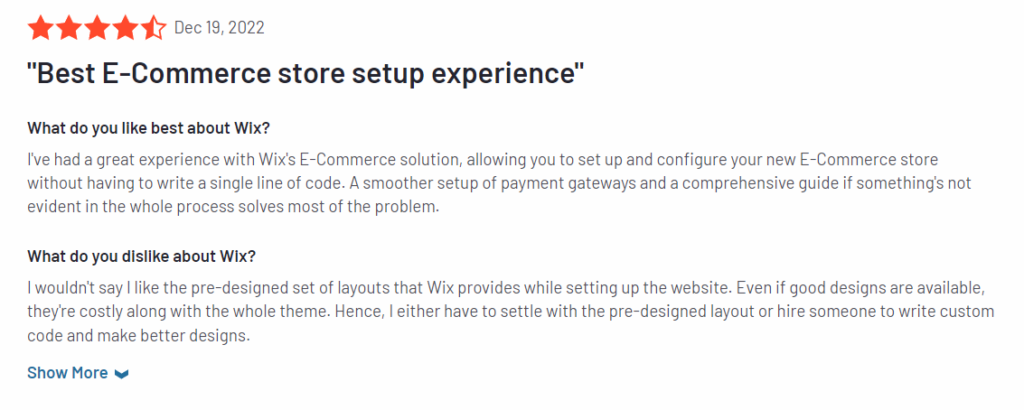
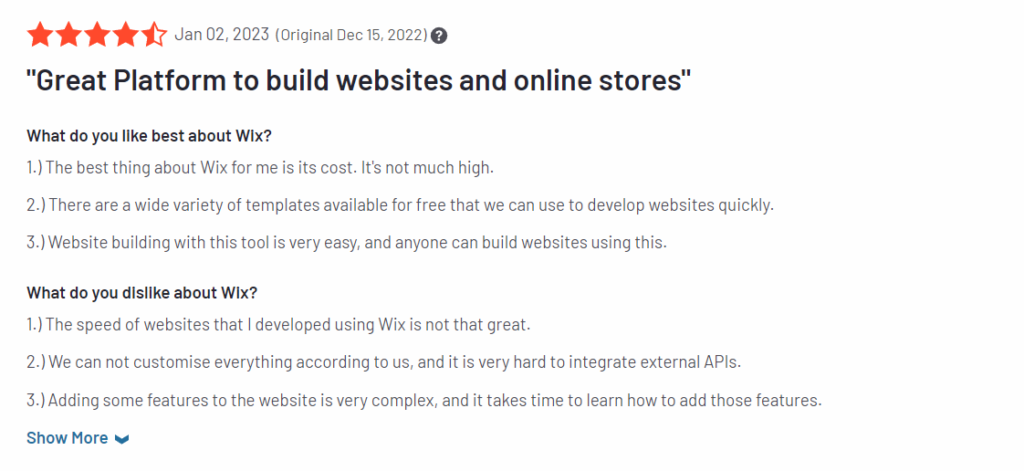
Wix Pricing
If you want to sell your products or services on Wix, you must look into its business plans. The platform has three dedicated plans for e-commerce.
| Feature | Business Basic | Business Unlimited | Business VIP |
| Storage | 50 GB | 100 GB | Unlimited |
| Customized Reports | No | No | Yes |
| Customer Support | Priority customer care | 24/7 customer care | 24/7 customer care |
| Pricing | $27/mo | $32/mo | $59/mo |
Learn more at Wix.com.
5.Zen Cart
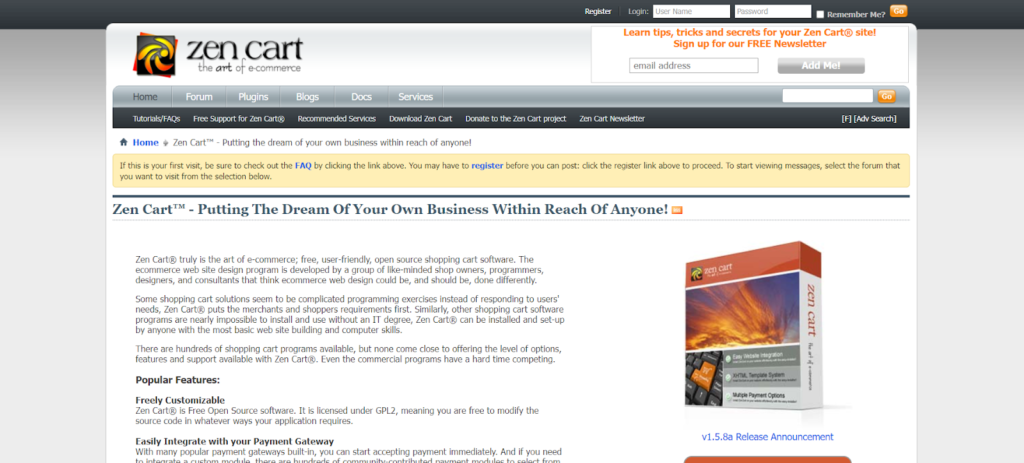
Zen Cart is a free, open-source shopping cart software that runs on self-hosted domains like WooCommerce. However, unlike the WordPress plugin, it’s not tied to a specific ecosystem. In fact, any server that supports PHP, Apache, and MySQL will run Zen Cart without any hiccups.
For an open-source tool with no hidden charges, Zen Cart packs a surprising amount of features. Take, for instance, its built-in support for major payment gateways or its custom module for recovering abandoned carts.
For technical support, Zen Cart has a forum where users help each other out. It also has a tutorials/FAQs section for addressing basic concerns.
Other Benefits Include:
- Support for Third-Party Integrations: With Zen Cart, you can integrate third-party apps and custom modules seamlessly into your store.
- Optimal Performance: Due to its small storage footprint, Zen Cart facilitates smooth transactions and optimal user experience.
Some Disadvantages:
- Outdated Software: Due to its slow development cycle, Zen Cart has some known issues like an obsolete dashboard and incompatibility with newer integrations.
- Technical Skills Requirements: Zen Cart can be challenging for new users, especially if they lack basic web development experience.
What Are Users Saying About Zen Cart?
At the time of writing, Zen Cart had 42 reviews on G2 with an average rating of 4.4 out of 5. Here’s a glimpse of what its users have to say:
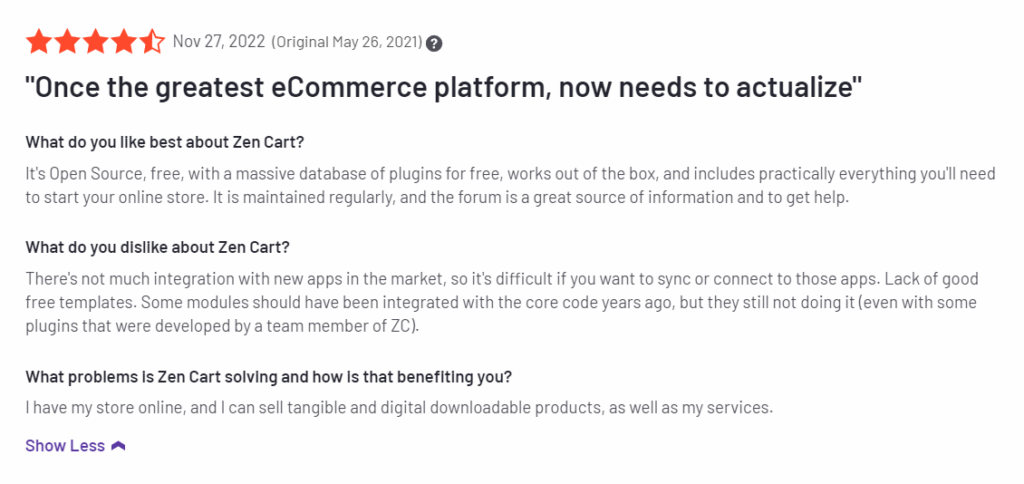

Zen Cart Pricing
Zen Cart is an open-source tool available free of charge to users. However, a domain name, hosting plan, and any integrations you want will incur variable costs.
6.Weebly
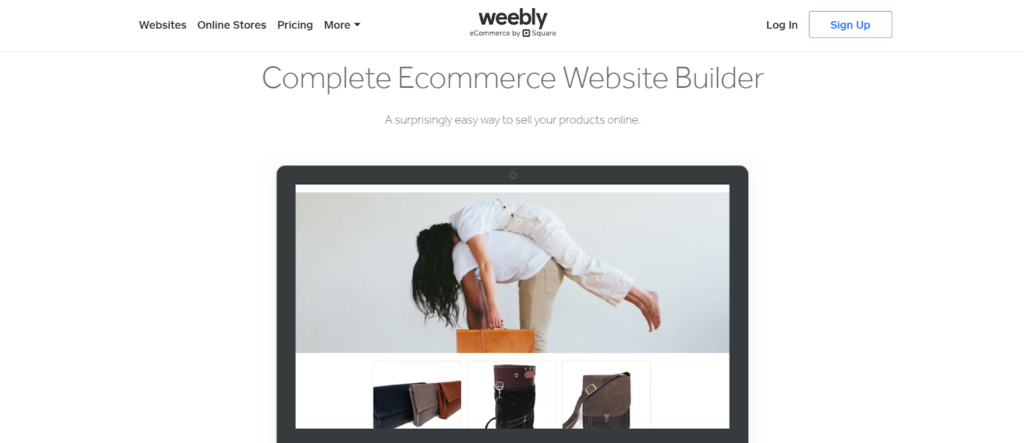
Weebly is one of the best drag-and-drop online store platforms in the market. But it has many other features that deserve equal, if not more, attention.
Consider its in-built analytics, for example. Weebly has an integrated dashboard that lets users track store performance. It also lets users pull up data from Weebly Promote and analyze unique visits, unsubscribes, and sales from email.
Weebly has shopping cart software that launches automatically with your store. As for payments, it offers seamless integration with various payment gateways and lets you accept credit cards directly from your store.
Weebly has three channels for customer support: email support, a dedicated phone line, and a community driven by user interaction.
Other Benefits Include:
- Real-time Shipping Calculator: Weebly offers an advanced shipping tool that lets you determine real-time shipping rates by carrier, weight, quantity, and destination.
- Membership Zones: With Weebly, you can create zones on your website accessible only to members. You can also decide whether your membership registrations are public or private.
- Customizable Email Templates: Weebly has customizable email templates to target abandoned cart owners and new visitors.
Some Disadvantages:
- Limited Design Options: Unlike Wix, where you can tweak every store component, Weebly only allows customizations that align with its framework.
- Lack of Regular Updates: Ever since its acquisition by Square, Weebly has been slow to roll out new features. Its product development blog, which receives only one update yearly, corroborates this finding.
What Are Users Saying About Weebly?
At the time of writing, Weebly had 448 reviews on G2 with an average rating of 4.2 out of 5. Here’s a glimpse of what its users have to say:
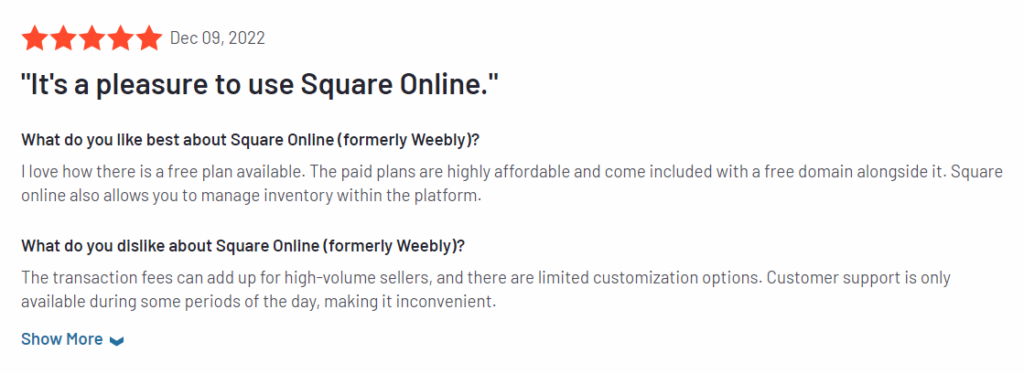
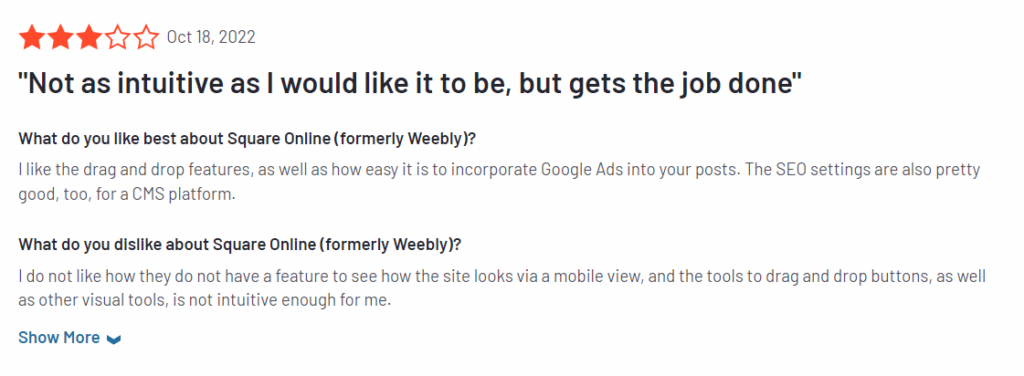
Weebly Pricing:
Weebly operates on a four-tier user model, with the initial tier being free:
| Feature | Free | Personal | Professional | Performance |
| Shipping Calculator | No | Yes | Yes | Yes |
| Item Reviews | No | No | No | Yes |
| Digital Goods Support | No | Yes | Yes | Yes |
| Pricing | $0/mo | $6/mo | $12/mo | $26/mo |
Learn more at Weebly.com
Also, are you looking to reach your customers through podcasts? Read about the 5 must-have features for a podcast hosting platform.
7.Squarespace

Squarespace e-commerce is Squarespace’s dedicated platform for business owners. It’s a versatile eCommerce software for small businesses looking to sell digital and physical goods online.
Like most e-commerce solutions, Squarespace offers plenty of customization options. That said, its real strength lies in merchandising.
Depending on your needs, Squarespace listings can be as intricate or as simple as you want. They can be organized into categories, added to intuitive menus, and embedded with videos, images, and related products.
Squarespace also makes managing inventories less tedious with features like unlimited storage, automatic catalogs, and timely alerts for low stock levels.
And for startups worried about shipping and fulfillment, it has a range of holistic solutions. This includes flexible shipping options, USPS shipping labels, and the ability to provide in-person pickups.
Other Benefits Include:
- Flexible Payment Options: With integrations like Afterpay, you can give customers in specific countries (US, Australia, New Zealand) the option to buy now and pay later.
- Advanced Selling Features: Squarespace enables you to build and expand your customer base using gift cards, social integrations, and monthly subscriptions.
- Robust Customer Support: Squarespace provides 24/7 technical support via email and Facebook Messenger. It also has a help center that offers in-depth guides, tutorials, free webinars, and a community forum.
Some Disadvantages:
- Limited International Support: Unlike Shopify and Wix, Squarespace has limited multilingual support. It also doesn’t lets users choose more than one currency for their stores.
What Users Are Saying About Squarespace?
At the time of writing, Squarespace had 1,029 reviews on G2 with an average rating of 4.4 out of 5. Here’s a glimpse of what its users have to say:
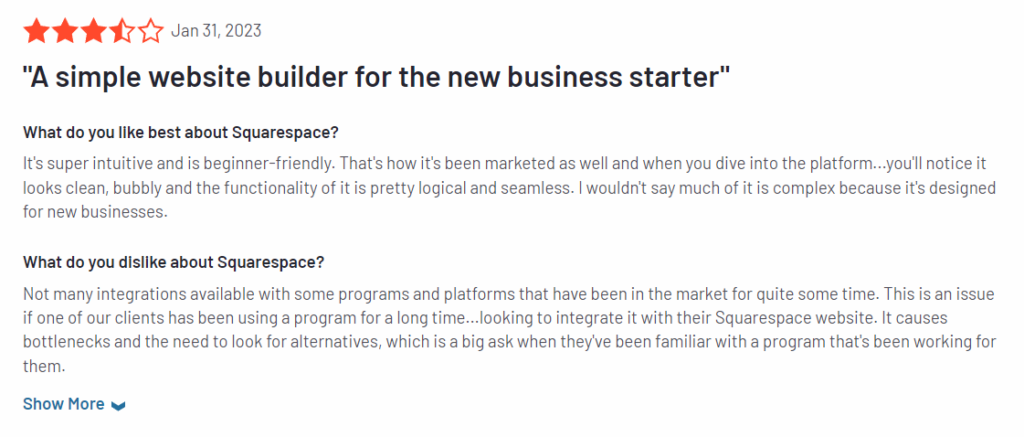
Squarespace Pricing
Squarespace offers four plans, out of which only three are suitable for e-commerce websites.
| Feature | Business | Commerce (basic) | Commerce (advanced) |
| Fully-Integrated transaction fee | 3% | 0% | 0% |
| Advanced Merchandising | No | Yes | Yes |
| Subscriptions | No | No | Yes |
| Pricing | $23/mo | $27/mo | $49/mo |
Learn more at Squarespace.com
8.Volusion

Volusion is one of the oldest names in the e-commerce solutions space. And, as per its claims, also the most scalable – with an incredible uptime rate of 99.9%.
But how does it perform in other areas? Is it flexible? Is it SEO-friendly? And more importantly, is it user-centric? Let’s find out.
According to its website, Volusion offers a broad range of mobile-responsive themes that support retina display, image optimization, and device-based block settings.
Volusion also boasts an impressive set of analytics and marketing features. Some important ones are:
- SEO optimization tools
- Social sharing and posting from stores
- An in-built newsletter publishing tool
- Insights on sales, returns, and CRM tickets
For enhanced web protection, the platform relies on free SSL certifications and firewall settings.
Other Benefits Include:
- Advanced Analytics: Volusion provides users with in-depth sales analytics, including ROI (return on investment) tracking through its in-built tools.
- Shipping and Fulfillment Support: With Volusion, you can specify shipping types, require signatures, provide flat rate options, and customize shipping rates.
- Support for International Sales: Volusion helps you sell internationally with tools supporting currency conversion and displaying prices in customers’ local currency.
Some Disadvantages:
- No Blog Support: Unlike Squarespace, Volusion doesn’t have a native blogging system, which can hinder your content marketing efforts.
- Limited Customer Support: Volusion doesn’t offer its basic users email or live chat support. The only way they can get assistance is through its help center.
What Are Users Saying About Volusion?
At the time of writing, Volusion had 62 reviews on G2 with an average rating of 3.2 out of 5. Here’s a glimpse of what its users have to say:
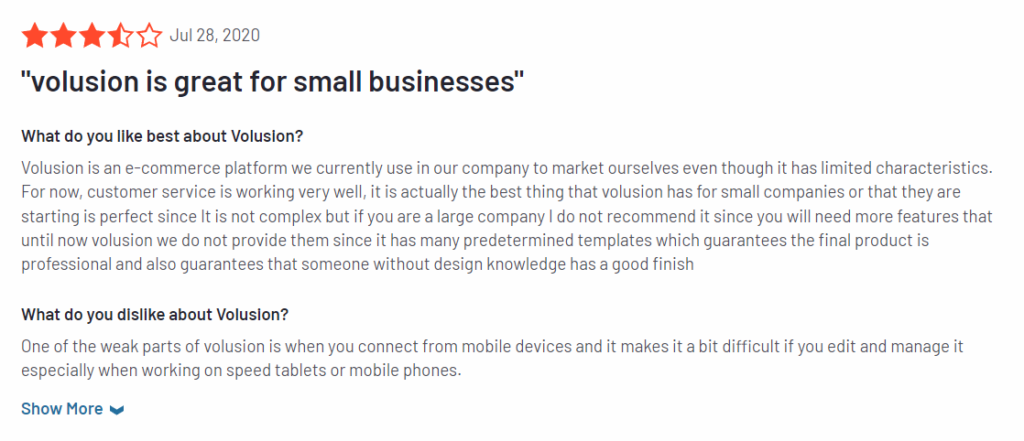

Volusion Pricing
Volusion has a four-tier pricing model:
| Feature | Personal | Professional | Business | Prime |
| Annual Sales Threshold | $50,000 | $100,000 | $400,000 | Unlimited |
| Max Products | 100 | 5,000 | Unlimited | Unlimited |
| Pricing | $35 | $79 | $299 | Based on your annual sales volume |
Learn more at Volusion.com
9.GoDaddy Online Store

Marketed heavily towards new users, the GoDaddy SaaS e-commerce platform has some astounding features. But if you had to choose just one feature to base your decision on, it has to be the AI-powered editor.
Yes, you heard that right. GoDaddy’s editor can create a store for you – based on your responses to some questions. And if you aren’t happy with the end result, you can edit it from any device, including a mobile phone.
For all your marketing needs, GoDaddy has a suite of services that lets you identify keywords, create emails, and whip up social media content.
And if you face any issues, there’s 24/7 customer support available on the phone, live chat, and GoDaddy’s Twitter account.
Other Benefits Include:
- Online Appointment Scheduler: If you want an easy-to-use appointment scheduler, look no further. With GoDaddy, your clients can book an appointment while avoiding double bookings and missed calls.
- Optimal Performance: When it comes to e-commerce hosting, GoDaddy knows a thing or two. With an uptime rate of 99.9% and performance monitoring tools, the company ensures seamless transactions for its users.
Some Disadvantages:
- Limited Third-Party Integrations: GoDaddy has just a handful of integrations and apps to customize your storefront. This might not be a dealbreaker initially, but it can lead to scalability issues in the future.
What Are Users Saying About GoDaddy Online Store?
At the time of writing, GoDaddy Online Store had 19 reviews on G2 with an average rating of 3.8 out of 5. Here’s a glimpse of what its users have to say:

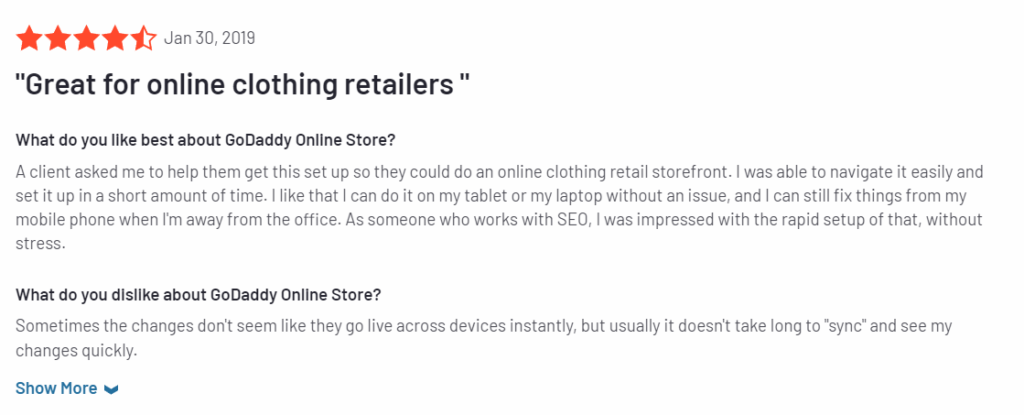
GoDaddy Online Store Pricing:
GoDaddy has only one plan for e-commerce sellers, priced at $16.99/mo. You can learn more about it on GoDaddy.com
10. Shift4Shop

Shift4Shop, formerly 3dcart, is a business website builder known for its wide array of in-built features. From mobile-ready templates to content marketing tools to integrated inventory management – you name it, and chances are Shift4Shop has it.
That said, there are some things that it does better than others, like flexible payment solutions. The platform claims its native payments processing system, Shift4, accepts credit cards and digital wallets and offers the buy now pay later option using select integrations ( Klarna, Sezzle, or Bread).
Shift4Shop also has a conversion boosting tool enabling you to give discounts and generate coupon codes. And if that’s not enough, it also lets you create store credits and launch affiliate programs to drum up business.
Other Benefits Include:
Customer-Centric Features: Retaining customers is much simpler with Shift4Shop’s RMA (return merchandise authorization) system, which allows you to manage returns and track customer requests directly from your store.
Some Disadvantages:
No Mobile App: Since people are constantly on the move, it makes perfect sense for e-commerce solutions to be portable. However, that’s not the case for Shift4Shop – which lacks a mobile app to support users on the go.
Limited Customer Support: When it comes to customer service, Shift4Shop has a long distance to go. User reviews on Capterra suggest the platform has recurring issues with legacy users. It also has trouble offering centralized support and timely responses.
What Are Users Saying About Magento?
At the time of writing, Shift4Shop had 32 reviews on G2 with an average rating of 3.8 out of 5. Here’s a glimpse of what its users have to say:
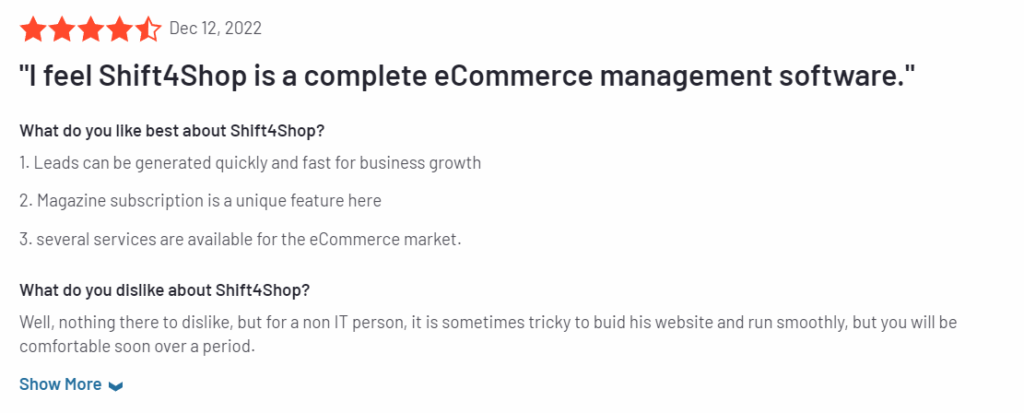
Shift4Shop Pricing
Shift4Shop has five plans, ranging from $0 to $1,999/mo. Since we’re concerned with small businesses, we’ll skip the most expensive solution:
| Feature | End-to-End E-commerce | Basic Store | Plus Store | Pro Store |
| Built-in Blog | No | Yes | Yes | Yes |
| Staff Users | 0 | 2 | 5 | 15 |
| Sales Integration | No | Yes | Yes | Yes |
| Pricing | $0/mo | $29/mo | $79/mo | $229/mo |
To learn more, visit Shift4Shop.com
Conclusion: Finding the best cheap e-commerce platforms
And there you have it! The best e-commerce platforms for small businesses are compiled after a thorough analysis of their price, features, scalability, and customization options.
Each of these platforms has its pros and cons, and frankly, none of them has all the features you can imagine. Therefore, your choice must be shaped by your needs, business philosophy, and, more importantly, your budget.
And if you’re still torn between two options, say Shopify and BigCommerce, you can opt for a free trial to get a sense of things.
Read More of our in-depth reviews:
- 9 best time clock apps with GPS feature
- Top Routific Competitors: Best Delivery Route Planning Software for your business
- Geekbot vs. DailyBot: Streamline Your Stand-ups And Team Communication
Edited by Shubhankar Das
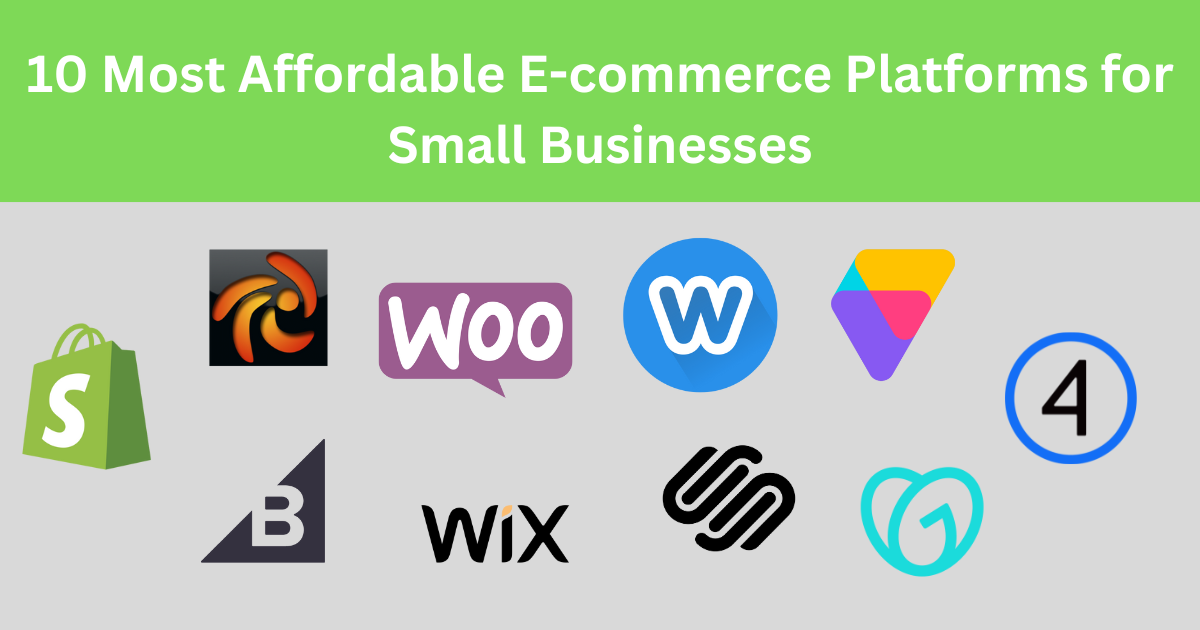
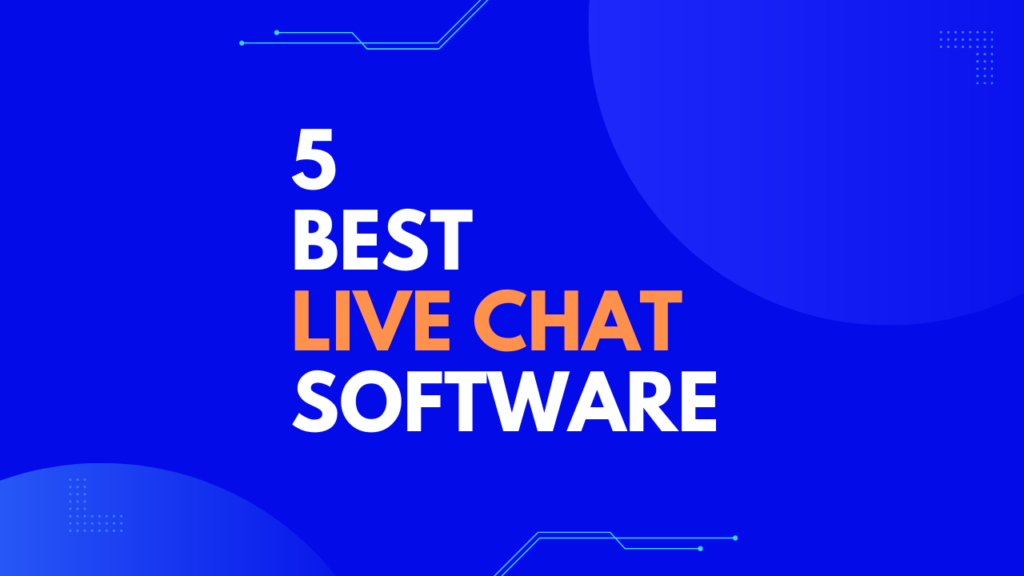
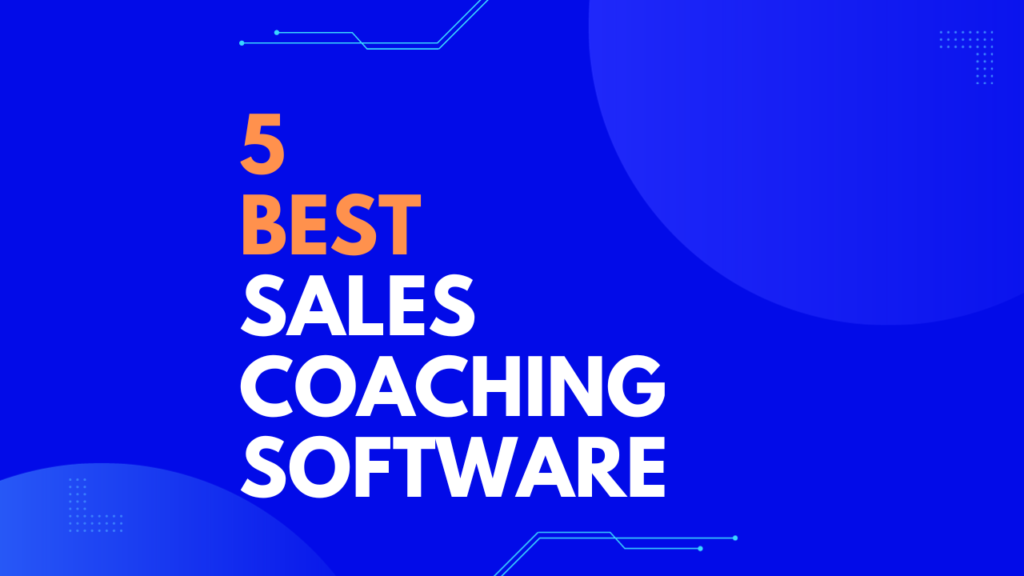

Simply desire to say your article is as surprising. The clearness in your post is simply excellent and i could assume you are an expert on this subject. Fine with your permission let me to grab your feed to keep up to date with forthcoming post. Thanks a million and please carry on the gratifying work.
Thanks Kylee for your kind words!